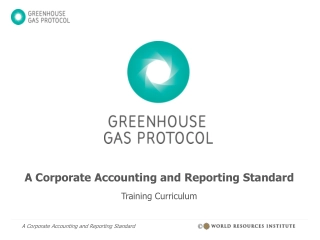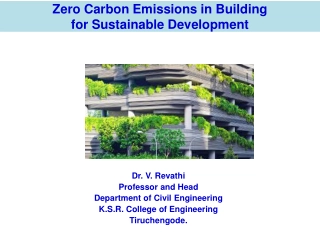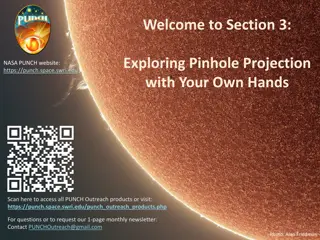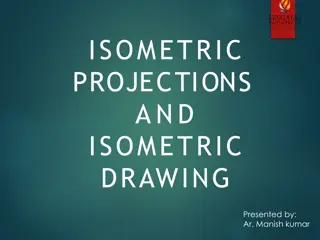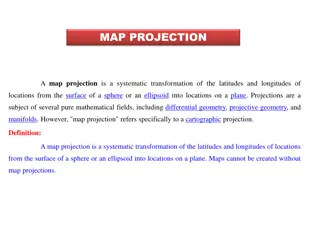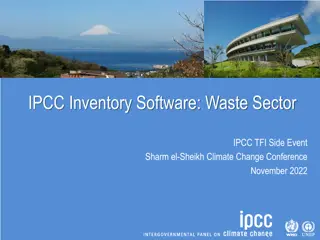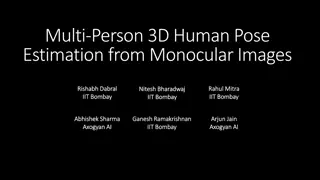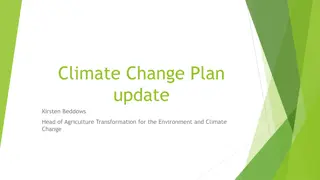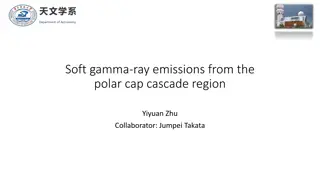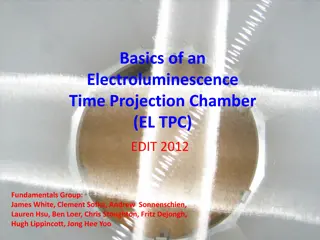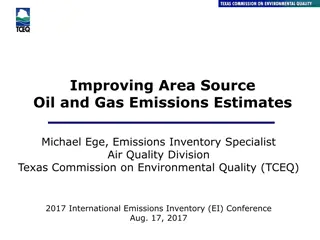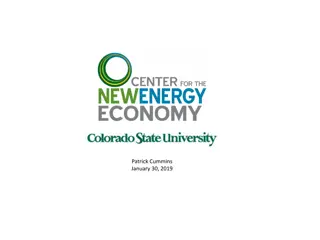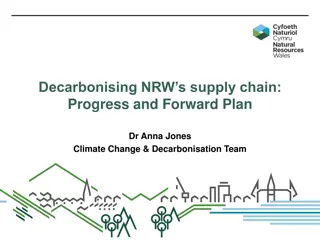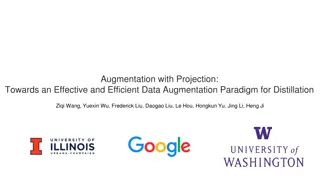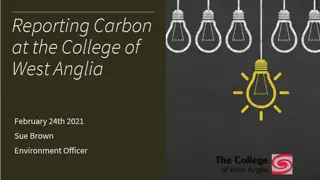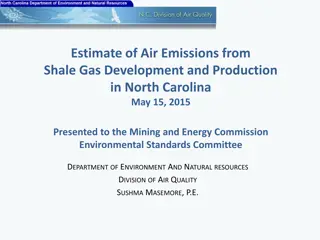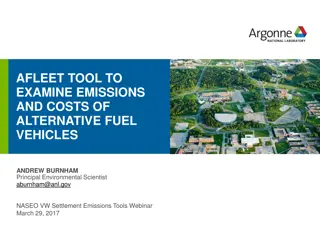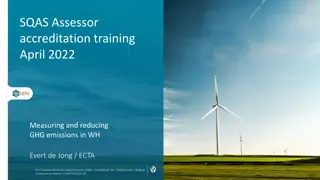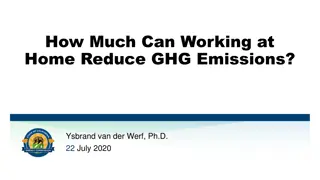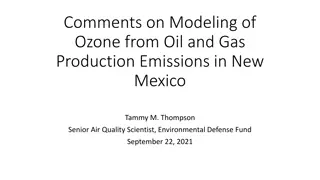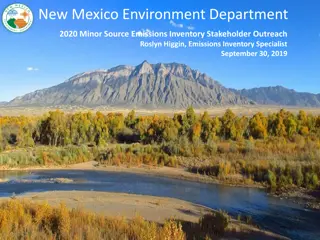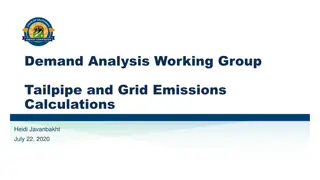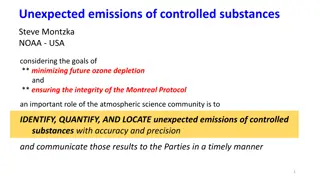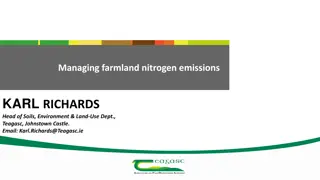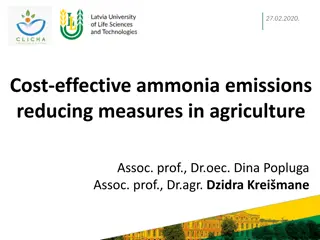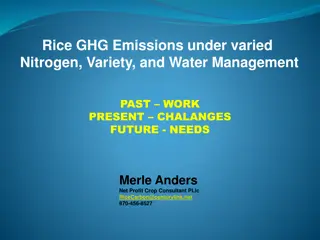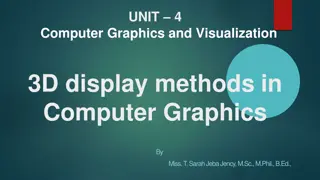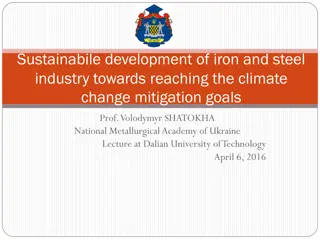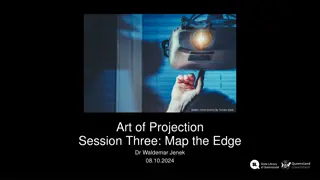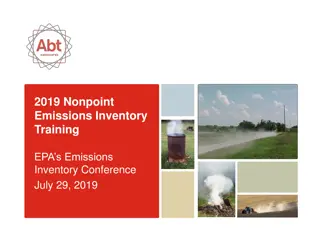A Corporate Accounting and Reporting Standard
This standard covers corporate accounting and reporting principles, tracking emissions over time, calculating emissions, and reporting GHG emissions.
2 views • 18 slides
A Corporate Accounting And Reporting Standard
Principles and guidelines for preparing GHG emissions inventories, focusing on organizational boundaries, operational boundaries, tracking emissions over time, calculating emissions, and reporting GHG emissions. It emphasizes relevance, completeness, consistency, transparency, and accuracy in accoun
1 views • 14 slides
A Corporate Accounting and Reporting Standard
This training curriculum covers principles of GHG accounting, organizational boundaries, setting operational boundaries, tracking emissions over time, calculating emissions, and reporting GHG emissions. It emphasizes the importance of determining which company operations and emissions sources to inc
2 views • 25 slides
Historic Investments in Climate Action: Inflation Reduction Act May 2023
The Inflation Reduction Act (IRA) of May 2023 focuses on making significant investments in climate action to reduce U.S. emissions by an estimated 40% by 2030. This act supports disadvantaged communities, the clean energy industry, and aims to drive emissions reductions over the next decade while pa
5 views • 14 slides
Understanding Sustainable Development and Zero Carbon Emissions in Buildings
Sustainable development aims to meet present needs without compromising future generations. Zero carbon emissions in buildings play a crucial role in combating climate change. This article explores the pillars of sustainability, greenhouse gases, global emissions, and steps towards achieving net zer
1 views • 56 slides
Energy Transition and NRE Potential in Indonesia's Path to NZE 2060
Indonesia is focused on transitioning to Net Zero Emissions by 2060, with a significant emphasis on New Renewable Energy (NRE) sources. The country has made strides in increasing NRE utilization, with promising potential in hydro, solar, wind, geothermal, and ocean energy. Additionally, Indonesia is
1 views • 9 slides
Tradeoffs Between Water Savings and GHG Emissions in Irrigated Agriculture
This study examines the tradeoffs between water savings, economic impact, and greenhouse gas emissions resulting from technological changes in the irrigation industry. Key objectives include estimating water savings for different crops, quantifying GHG emissions from new irrigation technologies, and
0 views • 24 slides
Understanding Consumption-Based Emissions Inventories in Boulder County
Consumption-Based Emissions Inventories (CBEIs) play a crucial role in assessing greenhouse gas emissions linked to local consumption patterns. By calculating emissions associated with products and services used by a community, CBEIs reveal significant gaps in traditional emissions tracking, emphasi
2 views • 13 slides
Exploring Pinhole Projection with NASA PUNCH Outreach
Dive into the world of pinhole projection with NASA's PUNCH Outreach program. Discover the art of observing pinhole images of the Sun, explore hands-on experiments, and deepen your understanding of this fascinating imaging technique. Join Bhanu, the ray of light, on a playful learning adventure thro
3 views • 16 slides
Understanding Pinhole Projection of the Sun with NASA PUNCH Outreach
Delve into the fascinating world of pinhole projection with NASA's PUNCH Outreach program. Explore how round images of the Sun are seen through non-round holes, learn how to use the 3-Hole PUNCH Pinhole Projector, and gain insights into pinhole imaging both indoors and outdoors. Discover the playful
1 views • 21 slides
Understanding Isometric Projections and Drawings
Isometric projections provide a way to represent objects in three dimensions on a two-dimensional surface, making it easier for non-technical individuals to grasp complex shapes. This article discusses the differences between orthographic and pictorial views, principles of projection, types of proje
6 views • 10 slides
Understanding Map Projections: Types and Applications
Map projection is a systematic transformation of latitudes and longitudes from a curved surface to a flat plane. There are various classifications based on construction methods, tangent surface position, view point of light, and qualities like equal area and equi-distance. Zenithal Polar Equidistanc
0 views • 9 slides
IPCC Inventory Software Enhancements for Waste Sector Emissions Estimation
Explore the latest enhancements in the IPCC inventory software related to waste sector emissions estimation. Major updates include subnational disaggregation, Tier 3 methods, wetlands supplement, and improvements in worksheet structure and layout. The software allows for detailed estimation of green
1 views • 10 slides
3D Human Pose Estimation Using HG-RCNN and Weak-Perspective Projection
This project focuses on multi-person 3D human pose estimation from monocular images using advanced techniques like HG-RCNN for 2D heatmaps estimation and a shallow 3D pose module for lifting keypoints to 3D space. The approach leverages weak-perspective projection assumptions for global pose approxi
0 views • 8 slides
Transforming Agriculture for Climate Change: Kirsten Beddows' Vision
Kirsten Beddows, Head of Agriculture Transformation, shares an updated Climate Change Plan focused on reducing emissions, achieving net-zero by 2045, and creating sustainable farming practices. The plan includes over a hundred new policies targeting emissions reduction, land use optimization, and ca
0 views • 9 slides
Understanding Soft Gamma-Ray Emissions from Pulsar Polar Caps
Soft gamma-ray emissions from the polar cap cascade region are a subject of interest in astrophysics, with studies focusing on the fundamental physical processes of pulsars and potential origins of non-thermal X-ray emissions. Researchers explore the emission processes, polar cap accelerators, casca
0 views • 16 slides
Understanding Electroluminescence Time Projection Chamber (EL TPC) Physics
Delve into the fundamentals of Electroluminescence Time Projection Chambers (EL TPCs) through concepts like electron drift, scintillation mechanisms in noble gases, and charge yield estimation. Explore the workings of EL TPC prototypes, such as ZEPLIN II/III and DarkSide, for applications like react
0 views • 23 slides
Advancements in Pixel Readout R&D for Large Liquid Argon Time-Projection Chambers
Explore the latest developments in pixel readout research and development for large liquid argon time-projection chambers (LArTPCs) presented by Dan Dwyer at the CYGNUS Collaboration Meeting. Learn about signal characteristics, wire signal ambiguity, challenges in true 3D readout, and the innovative
0 views • 13 slides
Emissions Reductions Beyond the Clean Smokestacks Act (CSA) Overview
Emissions Reductions Beyond the Clean Smokestacks Act (CSA) is a comprehensive program aimed at improving air quality by imposing limits on pollutant emissions from coal-burning facilities. The act has successfully achieved significant reductions in nitrogen oxide (NOx) and sulfur dioxide (SO2) emis
1 views • 12 slides
Enhancing Oil and Gas Emissions Estimates for Area Sources
This presentation by Michael Ege, an Emissions Inventory Specialist at the Texas Commission on Environmental Quality (TCEQ), focuses on improving area source oil and gas emissions estimates. It covers the methods used to estimate emissions, including the development of basin-specific equipment profi
0 views • 31 slides
Analysis of Fossil-Fired EGUs in Western States: Emissions Projection & Data Review
Compile comprehensive data on fossil-fired EGUs in 13 Western states from 2014-2017, focusing on plant characteristics, emissions, and future projections for 2028 considering closures, fuel switching, and regulatory controls. Review and correct data inconsistencies, incorporate new control measures
0 views • 21 slides
Decarbonising NRW's Supply Chain Emissions: Progress and Challenges
Dr. Anna Jones and her team are spearheading efforts in Wales to achieve net zero emissions by 2050, with a focus on decarbonising NRW's supply chain and the public sector. The Welsh public sector aims to collectively reach net zero by 2030, with a strong emphasis on reporting and reducing emissions
0 views • 10 slides
Effective Data Augmentation with Projection for Distillation
Data augmentation plays a crucial role in knowledge distillation processes, enhancing model performance by generating diverse training data. Techniques such as token replacement, representation interpolation, and rich semantics are explored in the context of improving image classifier performance. T
0 views • 13 slides
Corporate Energy Disclosure Requirements and Methodology
Corporations making energy disclosures on a college website by March 31st, 2021, must include annual UK energy use data, greenhouse gas emissions, methodology used, energy efficiency measures, and emissions intensity ratios. The disclosure covers Scope 1, 2, and 3 emissions, business travel, and met
0 views • 23 slides
Overview of Air Emissions and Quality Assessment in Shale Gas Development
The presentation discusses the estimation of air emissions from shale gas development and production in North Carolina, highlighting the importance of analyzing emissions from oil and gas activities and associated truck traffic. The process involves building emissions inventory, photochemical modeli
0 views • 22 slides
AFLEET Tool for Examining Emissions and Costs of Alternative Fuel Vehicles
AFLEET is a tool developed by Argonne National Laboratory to analyze the emissions and costs of alternative fuel vehicles. It provides insights into the benefits of using different fuel technologies and helps in decision-making for vehicle fleet management. The tool includes calculations for emissio
0 views • 25 slides
Greenhouse Gas Emissions Management in Warehouse Operations
The SQAS Assessor accreditation training in April 2022 focused on measuring and reducing greenhouse gas emissions in warehouse operations. The content covers emission questions, scope of emissions, energy consumption examples, disaggregation of emissions, emission intensity calculation, and strategi
0 views • 17 slides
Potential Reduction of GHG Emissions by Working at Home
This analysis explores the impact of increased remote work on reducing greenhouse gas emissions, particularly in the context of the COVID-19 lockdown. By examining workforce data, commuting patterns, and emission statistics in California, the study aims to quantify the potential decrease in GHG emis
0 views • 15 slides
Modeling the Impact of Oil and Gas Emissions on Ozone in New Mexico
Tammy M. Thompson, a Senior Air Quality Scientist at the Environmental Defense Fund, discusses the modeling of ozone from oil and gas production emissions in New Mexico. The analysis focuses on areas with high ozone concentrations and their overlap with oil and gas regions, highlighting the sensitiv
0 views • 8 slides
Understanding Emissions Inventory for Air Quality Management
Emissions inventory plays a crucial role in monitoring air pollutant discharges and assessing air quality. This article discusses the purpose of emissions inventory, distinguishing between actual and permitted emissions, and provides guidelines for preparing and reporting minor source emissions inve
0 views • 15 slides
Demand Analysis Working Group: Tailpipe and Grid Emissions Calculations Overview
This report discusses the methodology for calculating tailpipe emissions using vehicle stock and VMT data, along with grid emissions from charging PEVs. Challenges include differences in vehicle classifications and lack of trip forecast calculations. Mapping LDVs from CEC classes to EMFAC classes wa
0 views • 10 slides
Monitoring Unexpected Emissions of Controlled Substances for Ozone Protection
The atmospheric science community plays a crucial role in identifying, quantifying, and communicating unexpected emissions of controlled substances to support the goals of minimizing future ozone depletion and upholding the Montreal Protocol. By comparing observation-based estimates of global emissi
0 views • 13 slides
Managing Farmland Nitrogen Emissions: Strategies and Research Updates
Soils play a crucial role in greenhouse gas emissions and carbon sequestration. Karl Richards, Head of Soils, Environment & Land-Use Department at Teagasc, discusses the importance of managing farmland nitrogen emissions through various practices. Research focuses on reducing emissions and enhancing
0 views • 8 slides
Cost-effective Measures to Reduce Ammonia Emissions in Agriculture
Cost-effective strategies to reduce ammonia emissions in agriculture are crucial in Latvia, where a significant portion of emissions originate from the agricultural sector. The study focuses on potential measures, such as precise mineral fertilizer application, improved manure management, nitrogen f
0 views • 13 slides
Rice GHG Emissions under Varied Nitrogen, Variety, and Water Management Study in Arkansas
Detailed study on rice greenhouse gas emissions under varied nitrogen, variety, and water management treatments, focusing on nitrogen fertility, crop varieties, and water usage impact on methane and nitrous oxide emissions. Research examines optimal nitrogen rates for reduced global warming potentia
1 views • 18 slides
3D Display Methods in Computer Graphics: Parallel vs Perspective Projection
3D computer graphics utilize a three-dimensional representation for rendering images. This article discusses parallel and perspective projection methods, highlighting their differences in preserving proportions and creating realistic views. Parallel projection maintains relative proportions, while p
0 views • 14 slides
Sustainable Development of Iron and Steel Industry for Climate Change Mitigation
The lecture by Prof. Volodymyr SHATOKHA discusses sustainable development in the iron and steel industry to meet climate change mitigation goals. It examines current global climate targets, the role of the industry in greenhouse gas emissions, and the feasibility of reducing emissions. The study foc
0 views • 27 slides
Exploring the Art of Projection Mapping in Modern Home Cinema Workshop
Delve into the captivating world of projection mapping through a workshop led by Dr. Waldemar Jenek. Explore the basics, software tools, and creative applications of this technology, transforming everyday objects into dynamic visual displays. Gain hands-on experience with Premiere Pro, TouchDesigner
0 views • 24 slides
Understanding the Nonpoint Emissions Inventory Training Conference
The Nonpoint Emissions Inventory Training Conference held by the EPA provided valuable insights into nonpoint sources of emissions. Sessions covered topics such as NEI definition, previous processes, and developments in the 2017 NEI process. Tools like NEMOs and the Wagon Wheel were introduced to im
0 views • 53 slides
Projection Methods in Chemistry: A Survey of Linear and Nonlinear Techniques
Visualization and interpretation of high-dimensional data structures in chemistry can be achieved through projection techniques. Linear projection methods like PCA and Pursuit Projection allow for dimensionality reduction and clustering tendency exploration. The Intent Pursuit Projection (PP) techni
0 views • 26 slides


